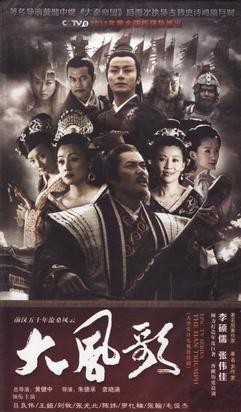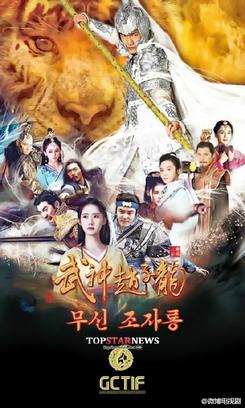
Xu Zhimo was a Chinese romantic poet and writer of modern Chinese poetry who strove to loosen Chinese poetry from its traditional forms and to reshape it under the influences of Western poetry and the vernacular Chinese language. He died in a plane crash at age 34.

The Emperor in Han Dynasty, also released under the title The Emperor Han Wu in some countries, is a 2005 Chinese historical drama television series based on the life of Emperor Wu of the Han dynasty. It uses the historical texts Records of the Grand Historian and Book of Han as its source material.

Romance of the Three Kingdoms is a Chinese television series adapted from the classical 14th century novel of the same title by Luo Guanzhong. The series was produced by China Central Television (CCTV) and was first aired on the network in 1994. It spanned a total of 84 episodes, each approximately 45 minutes long. One of the most expensive television series produced at the time, the project cost 170 million yuan. It was completed over four years and involved over 400,000 cast and crew members, including divisions of the People's Liberation Army from the Beijing, Nanjing and Chengdu military regions. Some of the dialogue spoken by characters was adapted directly from the novel. Extensive battle scenes, such as the battles of Guandu, Red Cliffs and Xiaoting, were also live-acted.

Three Kingdoms is a 2010 Chinese television series based on the events in the late Eastern Han dynasty and the Three Kingdoms period. The plot is adapted from the 14th century historical novel Romance of the Three Kingdoms and other stories about the Three Kingdoms period. Directed by Gao Xixi, the series had a budget of over 160 million RMB and took five years of pre-production work. Shooting of the series commenced in October 2008, and it was released in China in May 2010.

The Water Margin is a 1998 Chinese television series adapted from Shi Nai'an's classical 14th-century novel of the same title. It was produced by CCTV with Zhang Jizhong as producer. It was first broadcast in China in January 1998. The series also featured action choreography by Yuen Woo-ping.

Letter 1949 is a 2008 Taiwanese drama starring Queenie Tai, Lin Yo-wei, Alien Huang, Hawick Lau. It was produced by Eastern Shine Production. The series was broadcast on free-to-air Chinese Television System (CTS) from 9 to 26 November 2008, Monday to Thursday at 20:00.

The Han Triumph, also known as Wind Ode, is a Chinese television series based on historical events in the early Han dynasty, beginning with the founding of the dynasty by Liu Bang after his triumph over Xiang Yu, and the events leading to the reign of Liu Heng. Directed by Huang Jianzhong, the series starred Ray Lui, Wang Ji, Liu Mu, Zhang Guangbei, Chen Wei and Li Qingxiang in the leading roles. It was first broadcast on CCTV-8 in China on 17 December 2011.

Justice Bao is a Chinese TV series starring producer Jin Chao-chun as the Song dynasty official Bao Zheng. The series ran for 3 seasons from 2010 to 2012. In addition to Jin, Kenny Ho, Fan Hung-hsuan and Lung Lung again reprise their iconic roles from the 1993 Taiwanese hit Justice Pao and the 2008 Chinese series Justice Bao.

Tang Ming Huang is a Chinese television series based on historical events in the reign of Emperor Xuanzong of the Tang dynasty. The series was directed by Chen Jialin and starred Liu Wei as the eponymous emperor. It was first broadcast on CCTV-1 in 1990 in mainland China.

Wu Zi Bei Ge, also known as Wu Zi Bei Ge: Wu Zetian Zhuan, is a 2006 Chinese television series based on the life of Wu Zetian, the only woman in Chinese history to assume the title of "Empress Regnant". The series was directed and written by Chen Yanmin, and starred Siqin Gaowa and Wen Zhengrong as the empress. The series' title Wu Zi Bei Ge literally means "Song of the Uncharactered Stele", with the "stele" referring to the unmarked one standing near Wu Zetian's tomb at the Qianling Mausoleum.
The Legend of Crazy Monk is a Chinese television series about the life of Ji Gong. The series was directed by Lin Tianyi and based on Guo Xiaoting's classical novel Biography of Ji Gong. It was a hot TV series recently in Guangdong Television, Jiangsu Television and Shenzhen Television. It is shown on Mediacorp Channel 8 at 7pm.
Records of Kangxi's Travel Incognito is a Chinese television series revolves around the Manchu-ruling Qing Empire monarch Kangxi Emperor and the corruption he faces as he tries to make the government run efficiently. The series was directed by Zhang Guoli and produced by Deng Jie. The series consists of a total of 144 episodes shot in high definition, each 45 minutes long. The series is based on the events in the Kangxi era of the reign of Kangxi Emperor during the Qing Dynasty. The series also features Kangxi Emperor's family member and entourage in prominent roles and storylines, most notably his Concubine Yi and eunuch Sandezi and Buddhist monk Fayin, and Concubine Yi's servant girl Xiao Taohong. The program originally aired from 1998 to 2007, spanning five seasons and 144 episodes. For the first four seasons, the show starred Zhang Guoli and Deng Jie as Kangxi Emperor and Concubine Yi respectively. In the last season, John Lone and Irene Wan became the stars.

The Seven Heroes and Five Gallants is a 1994 Taiwanese television series produced by Chinese Television System (CTS) a few months after its prequel Justice Pao, which was also produced by Chao Ta-shen. Dozens of actors appeared in both series, but only Sze Yu and Tu Man-sheng reprised their roles. Fan Hung-hsuan and Lung Lung chose to portray new characters rather than their iconic roles.

God of War, Zhao Yun, also known as Chinese Hero Zhao Zilong, released under the title Dynasty Warriors in Indonesia, is a 2016 Chinese television series directed by Cheng Lidong and produced by Zhejiang Yongle Entertainment Co., Ltd. The series starred cast members from mainland China, South Korea and Taiwan: Lin Gengxin, Im Yoon-ah and Kim Jeong-hoon. The story is loosely adapted from the 14th-century Chinese classical novel Romance of the Three Kingdoms, with Zhao Yun as the main character. It was first aired on Hunan TV from 3 April to 7 May 2016.

With You is a 2016 Chinese streaming television series based on the novel The Best of Us (最好的我们) by Ba Yue Chang An (八月长安). It stars Liu Haoran and Tan Songyun in lead. It aired on iQiyi from 8 April to 14 May 2016.
Court Lady is a 2021 Chinese television series produced by Yu Zheng, starring Xu Kai and Li Yitong.

Love Scenery is a 2021 Chinese television series directed by Qin Zhen, adapted from the novel "A bright spear is easy to hide, but a secret love is hard to prevent" (明枪易躲,暗恋难防) by Qiao Yao. It starred Lin Yi and Xu Lu in the leading roles.














